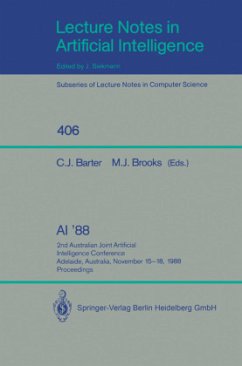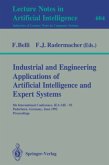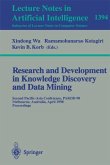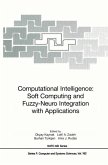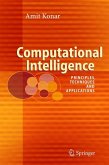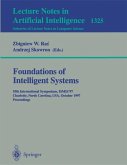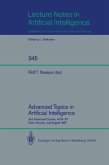Christopher J. Barter / Michael J. Brooks (eds.)2nd Australian Joint Artificial Intelligence Conference, Adelaide, Australia, November 15-18, 1988, Proceedings
AI '88
2nd Australian Joint Artificial Intelligence Conference, Adelaide, Australia, November 15-18, 1988, Proceedings
Herausgegeben:Barter, Christopher J.; Brooks, Michael J.
Christopher J. Barter / Michael J. Brooks (eds.)2nd Australian Joint Artificial Intelligence Conference, Adelaide, Australia, November 15-18, 1988, Proceedings
AI '88
2nd Australian Joint Artificial Intelligence Conference, Adelaide, Australia, November 15-18, 1988, Proceedings
Herausgegeben:Barter, Christopher J.; Brooks, Michael J.
- Broschiertes Buch
- Merkliste
- Auf die Merkliste
- Bewerten Bewerten
- Teilen
- Produkt teilen
- Produkterinnerung
- Produkterinnerung
The broad objective of this conference series is to bring business, industry and researchers together to consider the current activities and future potential of artificial intelligence, encompassing both practical and theoretical issues. Many papers were submitted, including some from Canada, France, UK, USA, Sweden, Italy and Thailand.
Andere Kunden interessierten sich auch für
![Industrial and Engineering Applications of Artificial Intelligence and Expert Systems Industrial and Engineering Applications of Artificial Intelligence and Expert Systems]() BelliIndustrial and Engineering Applications of Artificial Intelligence and Expert Systems81,99 €
BelliIndustrial and Engineering Applications of Artificial Intelligence and Expert Systems81,99 €![Research and Development in Knowledge Discovery and Data Mining Research and Development in Knowledge Discovery and Data Mining]() WuResearch and Development in Knowledge Discovery and Data Mining41,99 €
WuResearch and Development in Knowledge Discovery and Data Mining41,99 €![Computational Intelligence: Soft Computing and Fuzzy-Neuro Integration with Applications Computational Intelligence: Soft Computing and Fuzzy-Neuro Integration with Applications]() KaynakComputational Intelligence: Soft Computing and Fuzzy-Neuro Integration with Applications112,99 €
KaynakComputational Intelligence: Soft Computing and Fuzzy-Neuro Integration with Applications112,99 €![Computational Intelligence Computational Intelligence]() Amit KonarComputational Intelligence95,99 €
Amit KonarComputational Intelligence95,99 €![Foundations of Intelligent Systems Foundations of Intelligent Systems]() RasFoundations of Intelligent Systems81,99 €
RasFoundations of Intelligent Systems81,99 €![Advanced Topics in Artificial Intelligence Advanced Topics in Artificial Intelligence]() Rolf T. Nossum (ed.)Advanced Topics in Artificial Intelligence41,99 €
Rolf T. Nossum (ed.)Advanced Topics in Artificial Intelligence41,99 €![Applications and Innovations in Intelligent Systems VIII Applications and Innovations in Intelligent Systems VIII]() Ann Macintosh / Mike Moulton / Frans Coenen (eds.)Applications and Innovations in Intelligent Systems VIII81,99 €
Ann Macintosh / Mike Moulton / Frans Coenen (eds.)Applications and Innovations in Intelligent Systems VIII81,99 €-
-
-
The broad objective of this conference series is to bring business, industry and researchers together to consider the current activities and future potential of artificial intelligence, encompassing both practical and theoretical issues. Many papers were submitted, including some from Canada, France, UK, USA, Sweden, Italy and Thailand.
Hinweis: Dieser Artikel kann nur an eine deutsche Lieferadresse ausgeliefert werden.
Hinweis: Dieser Artikel kann nur an eine deutsche Lieferadresse ausgeliefert werden.
Produktdetails
- Produktdetails
- Lecture Notes in Computer Science 406
- Verlag: Springer / Springer Berlin Heidelberg / Springer, Berlin
- Artikelnr. des Verlages: 978-3-540-52062-7
- 1990.
- Seitenzahl: 476
- Erscheinungstermin: 7. März 1990
- Englisch
- Abmessung: 235mm x 155mm x 26mm
- Gewicht: 850g
- ISBN-13: 9783540520627
- ISBN-10: 3540520627
- Artikelnr.: 09215252
- Herstellerkennzeichnung Die Herstellerinformationen sind derzeit nicht verfügbar.
- Lecture Notes in Computer Science 406
- Verlag: Springer / Springer Berlin Heidelberg / Springer, Berlin
- Artikelnr. des Verlages: 978-3-540-52062-7
- 1990.
- Seitenzahl: 476
- Erscheinungstermin: 7. März 1990
- Englisch
- Abmessung: 235mm x 155mm x 26mm
- Gewicht: 850g
- ISBN-13: 9783540520627
- ISBN-10: 3540520627
- Artikelnr.: 09215252
- Herstellerkennzeichnung Die Herstellerinformationen sind derzeit nicht verfügbar.
A perspective on the nature of artificial intelligence.- What can massively parallel architectures bring to AI?.- Herbicide advisory systems: Weeds in wheat and other crops.- A real-time knowledge-based system for frequency management in communications.- Experiences in developing an intelligent operator guidance system.- Combining heuristics and simulation models.- The use of expert knowledge in the selection of CIG welding consumables.- A knowledge based simulation of critical incidents in anaesthesia.- DISSOLVE : A system for the generation of human oriented solutions to algebraic equations.- Student modelling in a keyboard scale tutoring system.- Contradictions and revisions as explanatory aids in the delivery of technical information.- A case study in deterministic prolog.- Exploring the epistemic labyrinth: New directions in the formal theory of knowledge representation.- A temporal relational calculus.- Counterfactuals, cotenability and consistency.- A knowledge acquisition tool for decision support systems.- Adaptive data stores.- Techniques for efficient empirical induction.- Representing exceptions in rule-based systems.- Conceptual graphs from a knowledge systems viewpoint.- Implementing second generation rule-based financial applications today.- Knowledge in context: A strategy for expert system maintenance.- Integrating knowledge acquisition and performance systems.- A machine vision system with learning capabilities.- Range from out of focus blur.- Environment mapping with a mobile robot using sonar.- Incorporating knowledge via regularization theory: applications in vision and image processing.- Common-sense resolution of syntactic ambiguity in database queries.- Capability based natural language understanding.- Character pattern recognition on a computational neural network.- Distributed planning and control for manufacturing operations.- Parallelism in nonmonotonic multiple inheritance systems.
A perspective on the nature of artificial intelligence.- What can massively parallel architectures bring to AI?.- Herbicide advisory systems: Weeds in wheat and other crops.- A real-time knowledge-based system for frequency management in communications.- Experiences in developing an intelligent operator guidance system.- Combining heuristics and simulation models.- The use of expert knowledge in the selection of CIG welding consumables.- A knowledge based simulation of critical incidents in anaesthesia.- DISSOLVE : A system for the generation of human oriented solutions to algebraic equations.- Student modelling in a keyboard scale tutoring system.- Contradictions and revisions as explanatory aids in the delivery of technical information.- A case study in deterministic prolog.- Exploring the epistemic labyrinth: New directions in the formal theory of knowledge representation.- A temporal relational calculus.- Counterfactuals, cotenability and consistency.- A knowledge acquisition tool for decision support systems.- Adaptive data stores.- Techniques for efficient empirical induction.- Representing exceptions in rule-based systems.- Conceptual graphs from a knowledge systems viewpoint.- Implementing second generation rule-based financial applications today.- Knowledge in context: A strategy for expert system maintenance.- Integrating knowledge acquisition and performance systems.- A machine vision system with learning capabilities.- Range from out of focus blur.- Environment mapping with a mobile robot using sonar.- Incorporating knowledge via regularization theory: applications in vision and image processing.- Common-sense resolution of syntactic ambiguity in database queries.- Capability based natural language understanding.- Character pattern recognition on a computational neural network.- Distributed planning and control for manufacturing operations.- Parallelism in nonmonotonic multiple inheritance systems.

